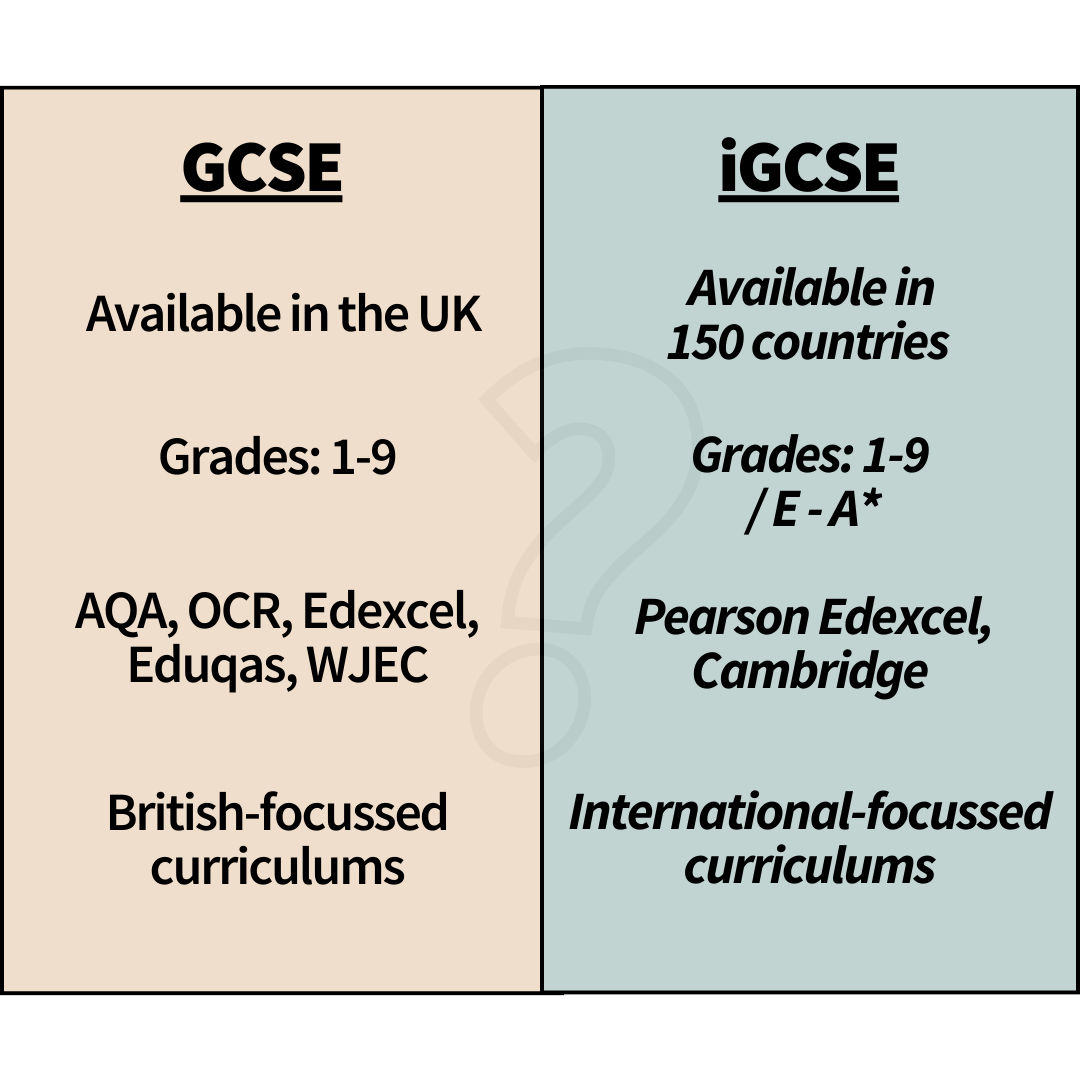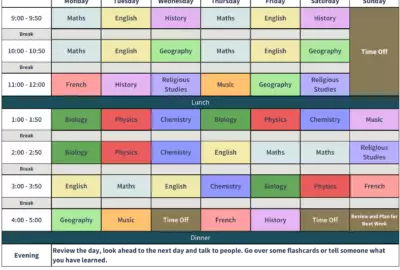
How Many GCSEs Do You Need To Take?
As students approach the final years of secondary school, GCSEs become a big part of the conversation. These qualifications are a key milestone, shaping future options for A-levels, university, apprenticeships, or even jumping straight into work.
But how many GCSEs do you need? This isn’t a question with a straightforward answer. The right number depends on individual goals and aspirations, making it essential to choose subjects thoughtfully. In this guide, we’ll walk through everything you need to know about GCSEs, from essential requirements to tips on selecting the best subjects—giving both students and parents a clear path through this important decision.
What Are GCSEs?
GCSEs, or General Certificates of Secondary Education, are a set of qualifications taken by students in the UK towards the end of their secondary school years, typically between ages 14 and 16. These exams cover a wide range of subjects, from core topics like Maths and English to various electives, allowing students to explore subjects aligned with their interests and future goals.
As foundational qualifications, GCSEs play a critical role in shaping a student’s academic journey. Not only do they assess a student’s knowledge and skills, but they also influence the options available for further education, such as A-levels, vocational courses, or apprenticeships. Strong GCSE results can open doors to competitive university courses and career pathways, making them a key stepping stone in every student’s educational development.
2.0 Top
Why Are GCSEs Important?
By testing understanding across a variety of subjects, GCSEs give students, teachers, and future educators a clear picture of each student's strengths and areas for growth.
These qualifications directly influence options for A-levels, vocational courses, and apprenticeships, all of which often have specific GCSE requirements. For university admissions, GCSE results can be especially significant—many universities look at GCSE grades as part of their entry criteria, particularly for competitive fields like medicine or engineering.
Beyond grades, GCSEs help students develop essential study skills and build effective habits, like time management and self-discipline. Preparing for these exams teaches students to approach challenges systematically, laying a strong foundation for the demands of higher education and future careers.

How Many GCSEs Should You Take?
This selection includes both core subjects—such as Maths, English Language, English Literature, and Sciences—and additional subjects chosen to reflect each student’s interests, strengths, or career aspirations. While some schools have structured requirements, students generally have flexibility to tailor their GCSE load to match their goals and capabilities.
Minimum Requirements and Core Subjects
Most schools and colleges require a minimum of five GCSEs to proceed to further education or secure certain job opportunities. The core subjects, which are compulsory across UK schools, include:
- Maths
- English Language
- English Literature
- Science
These core subjects are essential, as they provide foundational knowledge and skills critical for both academic progression and life skills. Achieving at least a grade 4 or higher in these subjects is usually required to pass, and in many cases, students must pass these core subjects at a specific level to continue into A-levels or higher education.
Popular Elective Subjects
Beyond the core subjects, students often choose several electives based on personal interests, future study plans, or potential career paths. Some popular options include:
Humanities: History, Geography, and Religious Studies, which help develop analytical and critical thinking skills.
Modern Foreign Languages: Such as French, Spanish, and German, which are valuable for students considering international work or studies.
Creative and Performing Arts: Subjects like Art and Design, Drama, and Music are available for students with creative aspirations.
Technology and IT: Subjects like Computer Science and Design and Technology, which are increasingly popular as technology becomes central to modern careers.
Physical Education (PE): A mix of theoretical and practical work for students interested in sports or health-related fields.
In addition to these, schools may offer other options such as Business Studies, Media Studies, or Citizenship, depending on the curriculum available.
Why 8 to 10 GCSEs?
Meeting Entry Requirements: Most sixth forms and colleges require at least five to six GCSEs at specific grades for A-level entry. By taking around eight or more, students ensure they meet these basic requirements with some flexibility.
Keeping Options Open: A selection of eight to ten subjects allows students to explore a range of disciplines, which can help them decide on specific areas to focus on in the future.
Balanced Workload: This range strikes a balance between achieving a comprehensive education and managing the workload effectively, as GCSE study requires significant time and effort for coursework, homework, and exam preparation.

Choosing More Than Ten GCSEs: Is It Worth It?
While taking more than ten GCSEs is uncommon, some students do opt for this route to showcase a broader range of skills or to pursue additional interests. For instance, students aiming for highly competitive fields like medicine, law, or selective universities may choose to take additional subjects to strengthen their academic profile. However, schools and educational advisors often recommend a maximum of 11 or 12 GCSEs to avoid burnout.
If you would like some support with GCSE options, we've already written a comprehensive guide for you.
Pros of Taking More GCSEs:
Enhanced Academic Profile: A broader array of subjects can demonstrate diverse knowledge and adaptability.
Exploration of Interests: For students who enjoy studying multiple fields, additional GCSEs allow for deeper exploration.
Cons of Taking More GCSEs:
Risk of Burnout: A heavier workload can lead to stress, potentially impacting performance across all subjects.
Quality vs Quantity: Many universities and employers value high grades over the sheer number of GCSEs taken. It’s often more beneficial to achieve strong results in fewer subjects than average results in a large number of subjects.
Core GCSE Subjects
These compulsory subjects provide essential skills and knowledge that serve as the foundation for both further studies and everyday life. The core subjects typically include:
Maths: Essential for developing problem-solving skills and numerical literacy, Maths is a critical subject that lays the groundwork for logical reasoning and analytical thinking. It’s also a key requirement for most A-level and university courses, as well as many careers.
English Language: A focus on reading, writing, and communication skills, English Language helps students convey ideas effectively and interpret complex information. Proficiency in English Language is vital for nearly all areas of further education and career paths.
English Literature (in most schools): Alongside Language, English Literature encourages critical thinking and cultural awareness through the study of classic and contemporary texts. This subject is compulsory in many schools and helps to refine reading comprehension and analytical skills.
Science: Science is required, though students can choose between different levels:
- Combined Science (Double Award): This course covers Biology, Chemistry, and Physics in a condensed format, leading to two GCSE grades.
- Separate Sciences (Triple Award): In some schools, students have the option to take Biology, Chemistry, and Physics as individual GCSEs, leading to three separate grades. This option is beneficial for students aiming to pursue Science or Medicine at A-level and beyond.
Additional Core Requirements: Some schools include extra compulsory subjects in the core curriculum, often depending on their specific curriculum or focus:
- Modern Foreign Languages: Languages such as French, Spanish, or German are sometimes required, particularly in schools aiming to equip students with global skills.
- Humanities: Subjects like History or Geography may also be mandatory, offering a well-rounded education in analytical and contextual understanding.

Elective GCSE Subjects
These 'elective' subjects (i.e. optional) allow students to explore a broader range of disciplines and can play a key role in preparing for specific academic or career paths.
Some of the most common elective subjects include:
Humanities: Subjects like History and Geography help develop analytical and critical thinking skills, making them popular choices for students interested in understanding society, culture, and global issues.
Modern Foreign Languages: Options such as French, Spanish, or German provide language skills valuable in a globalised world, particularly for careers involving travel, international business, or diplomacy
Creative and Performing Arts: Subjects like Art and Design, Drama, and Music are ideal for students with creative interests, fostering skills in self-expression and providing a strong foundation for careers in the arts.
Technology and IT: With subjects like Computer Science and Design and Technology, students can gain essential knowledge in digital literacy and programming, which are increasingly sought after in modern careers.
Physical Education (PE): PE combines practical and theoretical work in physical activity, making it a good fit for students interested in health, sports, or physical education.
Business and Economics: Subjects like Business Studies and Economics introduce students to foundational concepts in finance, economics, and management, beneficial for those interested in the business world.
Popular and Emerging Trends in GCSE Electives
Certain subjects have seen shifts in popularity over recent years. For example, Computer Science has grown significantly, reflecting the increased demand for digital skills. Meanwhile, interest in subjects like History and Geography remains high, while languages like German, Music, and classical studies have seen slight declines.
Ultimately, elective GCSE subjects give students a chance to explore interests and build skills that support both academic and personal growth, setting the stage for future education and career opportunities.
5.0 Top
How Many GCSEs Do You Need?
For most students, the five core GCSE subjects is considered the minimum requirement. This meets basic entry needs for A-levels or vocational courses, though many students take between eight and ten GCSEs. This range provides a solid foundation while allowing room for additional subjects that align with personal interests and future goals.
Though there’s technically no upper limit, schools typically recommend a maximum of twelve GCSEs to avoid overwhelming students. Taking more than ten subjects can be beneficial for those aiming for competitive fields, but it also risks burnout, and universities often value high grades over quantity. The number of GCSEs needed depends on each student’s goals after secondary school, whether that’s A-levels, university, apprenticeships, or entering the workforce directly.
However, here is a more comprehensive breakdown:
For A-Levels
Most sixth forms or colleges require at least five GCSEs, often with minimum grades in core subjects like English and Maths. Specific A-level subjects may require a GCSE in the same area, like a grade 6 or higher in Maths for A-level Maths.
For University Admission
Generally, universities expect at least five GCSEs at grade 4 (C) or above, including English and Maths. Competitive courses, such as Medicine or Engineering, may have higher requirements, often looking for strong grades (like 7-9) in relevant subjects, particularly in the sciences. Russel Group and Oxbridge Universities will favour candidates with at least ten GCSEs, and will expect candidates to achieve 8s and 9s in all or most of their subjects.
For Apprenticeships
The GCSE requirements vary depending on the level of apprenticeship. Intermediate apprenticeships may only need passes in English and Maths, while advanced and higher apprenticeships often look for five or more GCSEs at grades 4 and above, sometimes including subject-specific requirements.
For Immediate Employment
GCSEs in Maths and English are often essential for many entry-level jobs, as they demonstrate basic numeracy and literacy skills. While the number of GCSEs needed varies, having passes in these core subjects can make a big difference in job eligibility.

Tips for Choosing the Right GCSE Subjects
Choosing GCSE subjects can feel like a big decision, but keeping a few questions in mind can make it easier. Start by asking yourself what interests you most and what your future goals might look like. Do you have a specific career in mind? Are there subjects you’d like to continue studying at A-level? Choosing subjects that align with your goals can help keep options open for further education and careers.
It’s also helpful to consult with teachers, career counsellors, and family members, as they can offer advice on subjects that may suit your strengths or aspirations. Teachers, in particular, can provide insight into what each subject involves, helping you understand which might be the best fit.
Lastly, balance is key. While career goals are important, choosing subjects you genuinely enjoy can keep you engaged and motivated. A mix of practical and academic subjects can prevent burnout and ensure you get the most out of your GCSE years.
7.0 Top
GCSE Grading System
The GCSE grading system in the UK uses a 9-1 scale, with 9 being the highest grade and 1 the lowest. This system replaced the previous A* - E grades, making it easier to distinguish high achievers: a grade 9 is higher than the old A*, while grades 8 and 7 cover the former A grade range.
A “standard pass” is a grade 4, equivalent to a C in the old system, and is the minimum many A-level programs and jobs require in core subjects like English and Maths. A “strong pass” is a grade 5, reflecting a more secure understanding of the material and often favoured by competitive sixth forms and universities.
Understanding these distinctions is key for students aiming for A-levels or specific career paths, as strong grades in required subjects can open more doors for further study and employment.
We've written a full guide, which you can find below.
8.0 Top
Can You Take GCSEs at Any Age?
Yes, GCSEs are open to learners of any age. While they’re typically taken by students aged 14 to 16 in school, there are many options available for mature students or those returning to education later in life.
Adults or those outside the traditional age bracket can enrol in GCSE courses through local colleges, online platforms, or adult education centres, which often offer flexible study schedules and tailored support. Online courses are particularly popular, as they allow students to study at their own pace and access materials from anywhere, making it easier to balance learning with work or other commitments.
Whether taken to improve career prospects, qualify for further education, or simply learn something new, GCSEs remain accessible to learners of all ages.
If you are an adult student who would like support, contact our education team.

Traditional GCSEs vs. Online and International GCSE Options
Traditional In-School GCSEs are the standard option, taken in a school setting with a structured timetable, set teachers, and access to in-person resources and support. This method suits students who benefit from a classroom environment, as well as the routine and social interaction of regular school attendance. However, traditional GCSEs lack the flexibility of other options, with a fixed schedule and limited subject availability based on the school’s offerings.
Online GCSE Courses allow students to study from home, making this a flexible choice for those who need to fit learning around other commitments or prefer self-paced study. Online courses offer a wide range of subjects and can be beneficial for mature students, those with health needs, or students who prefer a personalised pace. However, they require self-motivation and strong time-management skills, as students won’t have the day-to-day structure of a school setting.
International GCSEs (IGCSEs) are equivalent to GCSEs but are designed for an international audience. They follow similar content but often include less coursework and focus more on exams, making them suitable for students studying outside the UK or those considering international education. IGCSEs are widely recognised globally, so they provide flexibility for students who may move or study abroad. However, because they are often exam-heavy, IGCSEs may not suit students who prefer continuous assessment.
Each option provides a pathway to achieve GCSE qualifications, allowing students to choose what best fits their educational needs, lifestyle, and future goals.
We've written two guides on iGCSEs, which you can find below:
10.0 Top
Timeline for Choosing and Taking GCSEs
Students in the UK typically begin choosing their GCSE subjects in Year 8 or 9, depending on their school’s schedule. Most schools start discussing options in Year 8, with final decisions made towards the end of Year 9. This early selection process allows students to start their GCSE courses in Year 10 and complete them by the end of Year 11.
An ideal timeline would involve students exploring potential subjects and discussing choices with teachers, parents, and advisors by early Year 9. This is a good time to consider future A-levels, university goals, or career paths, which may influence which GCSEs to take. Planning early ensures that students have enough time to make informed decisions, allowing for a smoother transition when GCSE coursework begins.
Seeking advice from teachers and academic advisors is key, as they can help students match their subject choices to their strengths and ambitions. Early planning also helps students manage expectations and stay prepared as they move into their GCSE years.
11.0 Top
What to Do If You Don’t Have Enough GCSEs?
If you haven’t met the GCSE requirements for your next steps, there are plenty of ways to move forward. One option is to retake GCSE exams; many colleges and online platforms offer GCSE resit courses, giving students a chance to improve their grades and meet criteria for further education.
For those interested in an alternative approach, qualifications like BTECs or vocational courses can be excellent options. BTECs focus on practical skills and are well-regarded for pathways into higher education or various career fields. By choosing BTECs or other vocational courses, students can work towards A-level equivalents, apprenticeships, or higher education without a full set of GCSEs.
Alternative pathways, such as foundation degrees, apprenticeships, or entry-level jobs, offer further options without strict GCSE requirements. Foundation degrees, for example, bridge the gap to university, while apprenticeships provide hands-on training with a wage, offering a practical and rewarding way to enter the workforce.
If you’re uncertain which path to take, Ivy Education is here to help. Our team can guide you through available options, whether it’s resits, alternative qualifications, or personalised academic support. Reach out to Ivy Education for tailored guidance to ensure you’re equipped to take the next step toward your goals.

Life After GCSEs: What Comes Next?
After GCSEs, students have a range of pathways available, each influenced by their interests, strengths, and long-term goals. Many choose to continue their education with A-Levels, which are typically required for university entry and allow students to specialise in subjects related to their future aspirations. A-Levels are ideal for students who want to keep their academic options open and can be an essential stepping stone for competitive university courses.
For those who prefer practical experience, vocational training and apprenticeships provide hands-on learning alongside academic study. Apprenticeships allow students to earn while they gain skills in industries like business, healthcare, engineering, and more, combining practical training with the chance to work toward higher qualifications.
Another option is to enter the workforce directly with an entry-level job, especially for students looking to build experience right away. While GCSEs provide essential skills for employment, students may also consider vocational qualifications to broaden their opportunities within specific industries.
For students unsure of their next steps, Ivy Education offers a range of support options. Our A-Level tutors can provide guidance on choosing subjects aligned with university or career goals, as well as top-notch tuition, while our University Consultants can help students plan for higher education success, from selecting courses to preparing competitive applications.
13.0 Top
Conclusion
GCSEs are a significant step in shaping academic and career paths, providing foundational skills and qualifications that open doors to various future opportunities. While important, GCSEs are just one part of a larger journey filled with flexible routes, from A-levels and apprenticeships to vocational training and university.
For students and parents alike, remember that there are many ways to achieve your goals. Choosing subjects thoughtfully and seeking guidance where needed can make all the difference. At Ivy Education, we’re here to support you in making the best decisions for a successful and rewarding future. Reach out to us for personalised advice on GCSEs, A-levels, and university planning.
14.0 Top
FAQs
Most students in the UK take between eight and ten GCSEs, covering core subjects and a selection of electives.
Most sixth forms require at least five GCSEs at grades 4-9, including passes in core subjects like English and Maths.
GCSE courses usually take two years, starting in Year 10 and finishing with exams at the end of Year 11, though some online courses may allow faster completion.
IGCSEs are international versions of GCSEs, covering similar content but often without coursework, making them suitable for both UK and international students.
Oxford and Cambridge generally expect a minimum of eight GCSEs at high grades (7-9), especially in subjects relevant to your intended course.
No, GCSEs don’t contribute to UCAS points, which are earned through Level 3 qualifications like A-levels and BTECs.
Yes, it’s possible to find entry-level work, but having at least five GCSEs, especially in Maths and English, improves job prospects.
To pursue Medicine, you’ll typically need at least seven GCSEs at grades 7-9, including strong results in Maths, English, and Science.
Other Articles

IGCSE vs GCSE: Differences You Should Know in 2025

What are IGCSEs?

Free GCSE Revision Timetable Template

GCSE Maths Exams Explained

How to Revise GCSE Maths

The Ultimate Guide to GCSE Revision

How to Get All 9s in your GCSEs?

How to Revise for English Literature GCSE
As featured in













